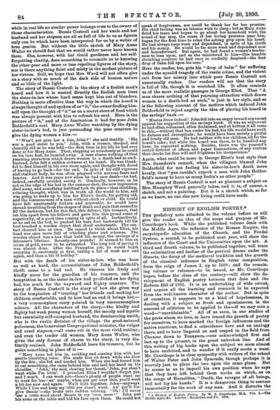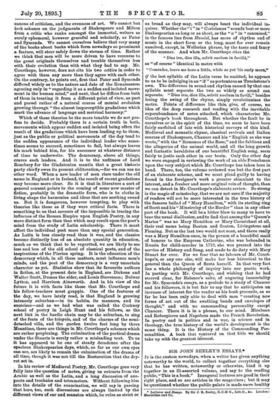HISTORY OF ENGLISH POETRY.*
THE prefatory note attached to the volume before us will give the reader an idea of the scope and purpose of Mr. Courthope's book. While the published volume deals with the Middle Ages, the influence of the Roman Empire, the encyclopdic education of the Church, and the Feudal System, a second, to be published next year, will show the influence of the Court and the Universities upon the art. A third and fourth volume, to be published together, will trace the culmination and decline of the poetical drama under the Stuarts, the decay of the mediwval tradition and the growth of the classical influence in English verse composition, from the reign of James I. up to 1688; and the remain- ing volume or volumes—to be issued, as Mr. Courthope hopes, before the close of the century—will show the de- velopment of English poetry between that date and the Reform Bill of 1832. It is an undertaking of wide extent, and argues all the learning and research to be expected from the well-known character of the author. But in spite of ourselves, it suggests to us a kind of hopelessness, in dealing with a subject so fresh and spontaneous, in the amount of criticism to be applied to the—if we may coin a word—" uncriticisable." All of us seem, in our studies of the poets whom we love, to have traced the growth of poetry for ourselves, to have marked the foreign influences and the native reactions, to find a coincidence here and an analogy there, and to have lingered on and reaped in the field from Chaucer down to Tennyson,—our acknowledged first and last up to the present, in the great unbroken line. And of this writing of big books upon the subject we seem almost to have surfeited, and to wonder if it really meets a want. Mr. Courthope is in close sympathy with writers of the school of Walter Pater and John Symonds, though perhaps it is scarcely just to place the two upon the same plane. But he seems to us to imperil his own position when he says that they have left behind them works on which, as on the songs of Heraclitias, "Death, the ravager of all beings, will not lay his hands." It is a dangerous thing to assume immortality for the work of any man. And it disturbs the • A History of English Poetry. By W. S. Courthope, M.A. Vol. L—The Middle Ages, Isc. London: Macmillan and Co. 1895.
canons of criticism, and the evenness of art. We cannot but look askance on the judgments of Shakespeare and Milton from a critic who ranks amongst the immortal, writers so surely ephemeral, however graceful and scholarly, as Pater and Symonds. We cannot ourselves believe that very many of the books about books which form nowadays so prominent a feature, will steer safely down the stream of time. Rather we think that men will be more driven to have recourse to the great originals themselves and trouble themselves less with their evolution than with what they had to say. Mr. Courthope, however, does not cite his two critics in order to agree with them any more than they agree with each other. On the contrary, he points out, first that Paler and Symonds differed widely as to the nature and date of the Renaissance, agreeing only in "regarding it as a sudden and isolated move- ment in the human mind," and next, that he differs from both of them in treating it from a different point of view, as part and parcel rather of a natural course of mental evolution growing through "the almost imperceptible gradations which mark the advance of language and metrical harmony."
Which of these theories be the more tenable we do not pro- fess to decide. Probably there is a certain truth in both, movements which appear sudden and isolated being often the result of the gradations which have been leading up to them, just as the public or political movements of the day tend to the sudden appearance of the individual leader who some- times seems to succeed, sometimes to fail, but always leaves his mark behind him, for his successor at whatever distance -of time to underwrite. The democracy, above all things, craves such leaders. And it is to the unfitness of Lord Rosebery for the Gladstonian mantle that a great historic party chiefly owes its present obliteration,—for we can use no other word. When a new leader of men rises under the old name in England or in Ireland, the result of recent gradations may become more clear. So it is that in literature a sort of general consent points to the coming of some new master of fiction, probably in the dramatic form, who is to clothe in living shape the harmonies and ideas that are seething round us. But it is dangerous, however tempting, to play with theories like these as if they were critical facts. There is something to us that savours of the impossible in tracing the influence of the Roman Empire upon English Poetry, in any more distinct form than that which may result upon the poet's mind from the study of Latin scholarship. There it must affect the individual poet more than any special generation. As Latin is less closely read than it was, and the classics become distinctly less of an absolute quantity in education, much as we think that to be regretted, we are likely to see less and less of the old school of classical poets, and of the inspirations of the Pierian spring. It is the education of the .democracy which, in all these matters, must influence men's minds, and the poet of the democracy is a very uncertain character as yet. Statistics show that its favourite authors in fiction, at the present date in England, are Dickens and Walter Scott, Dumas the elder, and Louis Stevenson; Bulwer Lytton, and Harrison Ainsworth. And in his view of the future it is with facts like these that Mr. Courthope and his fellow-teachers must grapple. One of the features of the day, we have lately read, is that England is growing intensely suburban—in its habits, its manners, and its exercises—and as we had what was called the Cockney school of poetry in Leigh Hunt and his fellows, so the next link in the bardic chain may be the suburban, to sing of the feats of the tricycle, and of the charms of the semi- detached villa, and the garden twelve feet long by three Meantime, there are things in Mr. Courthope's schemes which are rather perplexing. The culmination of the poetical drama under the Stuarts is surely rather a misleading text. To us it has appeared to be one of steady decadence after the spacious Shakespearian days, which, as far as our own eyes can see, are likely to remain the culmination of the drama of all time, though it was not till the Restoration that the dry- rot set in.
In his review of Medimval Poetry, Mr. Courthope goes very fully into the question of metre, giving us extracts from the Arabic as well as the Latin, and a long discussion of ana- pasts and trochaics and tetrameters. Without following him into the details of the examination, we will say in passing that here, too, such discussions are always limited by the different views of ear and scansion which, be rules as strict or as broad as they may, will always beset the individual in- quirer. Whether the" i "in " Coriolanns "sounds best or more Shakespearian as long or as short, or the " o " in "canonised," in the famous line from Hamlet, has more of rhythm and of music in the short form or the long, must for ever remain unsolved, except, in Wellerian phrase, by the taste and fancy of the scanner. And when Mr. Courthope cites the "Dies irte, dies ills, solvit sseclum in favillk" as "of course" identical in metre with "Comrades, leave me here a little, while as yet 'tis early morn," if the last syllable of the Latin verse be omitted, he appears to us to be indulging in an" if" as portentous as Touchstone's own. The difference in sound and rhythm caused by that one syllable must separate the two as widely as sound can separate. "Dies iris, dies illa, solvit smclum in favill," besides losing the swing of the rhyme, simply revolutionises the metre. Points of difference like this, give, of course, no idea of the deep research and reading with the inevitable superabundance of notes attached, which characterise Mr. Courthope's book throughout. But whether the fault be in ourselves or in the spirit of the time, we seem to have been fairly surfeited of late with historical surveys of this kind. Medimval and monastic rhyme, classical revivals and Italian sources of Shakespeare, Chaucer and his "English as she was wrote," with the "Romance of the Rose," and the fabliaux and the allegories of the animal world, and all the long growth and fantastic heraldries of our beautiful English song, seem fairly to jostle each other in our brain. Only the other day we were engaged in reviewing the work of an able Frenchman upon the very subject which Mr. Courthope has taken here in hand. There, too, the volume reviewed was but the first part of an elaborate scheme, and we must plead guilty to having found in the foreigner's work a greater stimulant to the interest, and a fresher and more original vein of thought, than we can detect in Mr. Courthope's elaborate review. So strong is the magic of minstrelsy, that we are not sure if the majority of readers will not be more interested in the true history of the famous ballad of "Mary Hamilton," with its sterling ring of Scott and his " Minstrelsy of the Border" than in any other part of the book. It will be a bitter blow to many to have to bear the usual disillusion, and to find that among the " Queen's Manes" was no Mary Hamilton or Mary Carmichael at all, their real name being Beaton and Seaton, Livingstone and Fleming. But as the last two would not scan, and there really was a Mary Hamilton once, in the person of a beautiful maid of honour to the Empress Catherine, who was beheaded in Russia for child-murder in 1719, she was pressed into the service of History and Song, and made to do duty with Mary Stuart for ever. For we fear that no labours of Mr. Court- hope's, or any one else, will make her less historical to the general than the Queen of Scots herself. In that very fact lies a whole philosophy of inquiry into our poetic work. In parting with Mr. Courthope, and wishing that he had steered clear, for Balance's sake, of auguring immortality for Mr. Symonds's essays, as a prelude to a study of Chaucer and his followers, it is but fair to say that he anticipates an increase of interest for the reader as his book proceeds, as so far he has been only able to deal with men "creating new forms of art out of the swathing bands and envelopes of thought," and with no commanding personality except Chaucer. There it is in a phrase, to our mind. Mirabeau and Robespierre and Napoleon made the French Revolution. In poetry and in politics and in war, in science and in theology, the true history of the world's development is the same thing. It is the History of the Commanding Per- sonalities. A book that ventured on that title we should take up with the greatest interest.



































 Previous page
Previous page